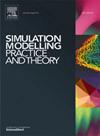多访问边缘计算中基于强化学习的细粒度任务自适应卸载方案
IF 3.5
2区 计算机科学
Q2 COMPUTER SCIENCE, INTERDISCIPLINARY APPLICATIONS
引用次数: 0
摘要
在多访问边缘计算环境下,设备资源和能量的限制对满足延迟敏感和高资源需求任务的要求提出了挑战。为了解决这一问题,本文提出了一种基于细粒度任务排序(AOD-FTS)的自适应卸载决策。为提高任务执行效率和资源利用率,在细粒度任务模型中设计子任务调度优化算法,优化子任务执行顺序,提高子任务并行性。此外,为了减少任务延迟和能量消耗,我们提出了一种基于有序子任务的自适应多目标强化学习卸载算法,该算法通过多目标马尔可夫决策过程制定。该方案根据环境变化和任务完成状态动态调整优化偏好,做出卸载决策。仿真结果表明,与两种基准算法相比,提出的AOD-FTS方案实现了:(1)更高的任务完成率,(2)提高了资源利用效率,(3)延迟分别降低81.66%和51.53%,(4)能耗分别降低39.72%和71.36%。本文章由计算机程序翻译,如有差异,请以英文原文为准。
Adaptive offloading scheme of fine-grained tasks based on reinforcement learning in multi-access edge computing
In the context of multi-access edge computing, the constraints on device resources and energy pose a challenge in meeting the requirements of delay-sensitive and high-resource demand tasks. In order to address this issue, this paper puts forth an adaptive offloading decision based on fine-grained task sequencing (AOD-FTS). To enhance task execution efficiency and resource utilization, we design scheduling optimization for subtasks algorithm within the fine-grained task model to optimize the execution order of subtasks and improve subtask parallelism. Additionally, to reduce task delay and energy consumption, we propose an adaptive multi-objective reinforcement learning offloading algorithm based on ordered subtasks, formulated through multi-objective Markov decision processes. The scheme dynamically adjusts optimization preferences according to environmental changes and task completion states to make offloading decisions. Simulation results demonstrate that compared with two benchmark algorithms, the proposed AOD-FTS scheme achieves: (1) higher task completion rates, (2) improved resource utilization efficiency, (3) 81.66 % and 51.53 % reductions in delay respectively, and (4) 39.72 % and 71.36 % reductions in energy consumption respectively.
求助全文
通过发布文献求助,成功后即可免费获取论文全文。
去求助
来源期刊

Simulation Modelling Practice and Theory
工程技术-计算机:跨学科应用
CiteScore
9.80
自引率
4.80%
发文量
142
审稿时长
21 days
期刊介绍:
The journal Simulation Modelling Practice and Theory provides a forum for original, high-quality papers dealing with any aspect of systems simulation and modelling.
The journal aims at being a reference and a powerful tool to all those professionally active and/or interested in the methods and applications of simulation. Submitted papers will be peer reviewed and must significantly contribute to modelling and simulation in general or use modelling and simulation in application areas.
Paper submission is solicited on:
• theoretical aspects of modelling and simulation including formal modelling, model-checking, random number generators, sensitivity analysis, variance reduction techniques, experimental design, meta-modelling, methods and algorithms for validation and verification, selection and comparison procedures etc.;
• methodology and application of modelling and simulation in any area, including computer systems, networks, real-time and embedded systems, mobile and intelligent agents, manufacturing and transportation systems, management, engineering, biomedical engineering, economics, ecology and environment, education, transaction handling, etc.;
• simulation languages and environments including those, specific to distributed computing, grid computing, high performance computers or computer networks, etc.;
• distributed and real-time simulation, simulation interoperability;
• tools for high performance computing simulation, including dedicated architectures and parallel computing.
 求助内容:
求助内容: 应助结果提醒方式:
应助结果提醒方式:


